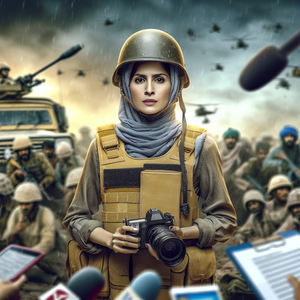
Navigating the Path to Becoming a War Correspondent: Essential Skills and Opportunities in Conflict Journalism
Embarking on a career as a war correspondent is a bold and transformative journey, offering the chance to witness and report on some of the world's most pressing crises. This profession is not for the faint-hearted; it demands a unique blend of courage, ethical integrity, and a passion for storytelling. This guide aims to illuminate the various pathways, skills, and roles associated with conflict journalism, providing a roadmap for aspiring war correspondents. While a degree in journalism serves as a strong foundation, practical experience, ethical judgment, and a deep understanding of global issues are equally crucial. Many new journalists start as freelancers, sharing compelling stories from conflict zones with diverse media outlets. The field encompasses a variety of roles—from war correspondents to photojournalists, foreign correspondents, and beyond—each requiring specific skills and adaptability. Herein, we explore the essential qualifications, opportunities, and insights needed to thrive in this challenging yet rewarding domain of journalism.
Job Summaries:
War Correspondent:
- A war correspondent is a journalist who delivers real-time updates from conflict zones.
- Requires sharp investigative skills and the ability to perform under pressure.
- They gather information, conduct interviews, and create articles or broadcasts that keep global audiences informed.
- Success in this role typically hinges on a solid journalism background, experience, and specialized training for hostile environments.
Freelance Photojournalist:
- Freelance photojournalists capture the essence of war through powerful imagery.
- Working independently or on assignment.
- They must possess both technical photography skills and a knack for visual storytelling.
- Building a strong portfolio and effectively managing business affairs are critical.
- Preparedness for the risks associated with dangerous locations is essential.
Foreign Correspondent:
- Foreign correspondents provide in-depth reports on international stories that resonate with their home audiences.
- Often specializing in specific regions or topics.
- They benefit from degrees in journalism or international relations.
- They are fluent in relevant languages.
Conflict Zone Journalist:
- Conflict zone journalists focus on on-the-ground reporting from areas experiencing war or civil unrest.
- They conduct investigations, interviews, and assess the humanitarian impacts of conflict.
Investigative Journalist:
- Investigative journalists tackle crucial issues by uncovering hidden truths through thorough research and interviews.
- In the realm of conflict reporting, they may investigate war crimes or the civilian impact of war.
War Documentary Filmmaker:
- War documentary filmmakers craft visual narratives that delve into the realities of conflict.
- This role necessitates strong storytelling capabilities, technical skills, and a solid grasp of the ethical considerations involved in documenting war.
Human Rights Journalist:
- Human rights journalists focus on exposing violations and advocating for vulnerable populations affected by conflict.
- They investigate abuses and strive to raise awareness through their reporting.
Editor for Conflict Reporting:
- Editors in conflict reporting oversee journalists' content from war zones, ensuring accuracy and adherence to ethical standards.
- They collaborate with correspondents to refine stories and maintain a consistent publication voice.
Safety Trainer for Journalists:
- Safety trainers prepare journalists for the risks associated with reporting in conflict zones.
- They provide training in risk assessment, security protocols, and emergency response.
War Research Analyst:
- War research analysts study conflicts.
- They provide insights to media organizations and policymakers.
- They investigate the causes and implications of war.
- They produce reports that inform vital discussions.
The world of war correspondence offers diverse and impactful career opportunities for those willing to embrace its complexities. A commitment to ethical journalism, continuous learning, and adaptability is vital for thriving in this challenging field. As global dynamics continue to shift, the demand for skilled and dedicated war correspondents remains ever-present. By actively pursuing relevant training and experiences, aspiring journalists can embark on a meaningful journey in conflict journalism, contributing significantly to the crucial discourse surrounding global conflicts.
Explore More Jobs
